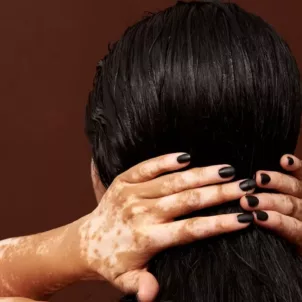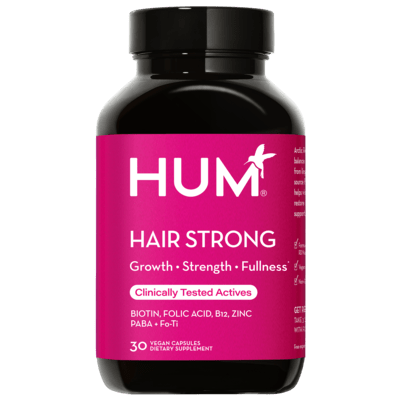You are what you eat may be the more common idiom, but just as accurate is the phrase: Your hair is what you eat.
“What we eat has a direct impact on how healthy we are overall, as well as how healthy our hair is,” says double board-certified plastic surgeon Hardik Doshi M.D. FACS a lead surgeon and hair restoration specialist with Ample Hair, a hair restoration clinic in New York City, NY. Yep, what you put in your mouth really impacts hair that grows (or doesn’t) on your head,
When individuals consume nutrient-dense diets made of adequate calories and protein, they are more likely to have healthy hair—hair that grows approximately 0.5 inches per month, has a smooth and polished appearance, holds moisture nicely, is durable and resistant to breaking, and has a low shedding rate— than individuals who do not, says Dr. Doshi. Meanwhile, individuals with nutritional deficiencies are more likely to have hair marked by dryness, dullness, brittleness, broken ends, slow growth, profuse shedding, and scalp problems such as dandruff or excessive oiliness, he says.
But what foods and supplements should you eat for hair growth? Ahead, five expert-approved nutrition tips and tricks that will keep your hair healthy, tresses thick, and even support future hair growth.
It’s Important To Consume Enough Calories
“Hair follicles require energy to grow and maintain healthy hair,” says board-certified dermatologist and hair-loss specialist Peter Young MD, the medical director of Nurx Dermatology. In fact, due to how often they divide and replicate, hair follicles are amongst the most metabolically active cells in the body, per research published in Dermatology Practical & Conceptual.
While the toxic diet culture of the early decades gave calories a bad reputation, they are actually just a measurement of how much energy is in food. “Consuming sufficient calories is crucial for normal hair growth,” he says. Without adequate calorie intake, the body may prioritize essential functions—like respiratory, brain, and reproductive function—over hair health and growth, which can lead to hair thinning and shedding, he says. Not ideal for anyone looking to lengthen their locks.
How many calories does an individual need to consume for hair and overall health?
That depends on a variety of factors, including age, activity level, body composition, and health status. For reference, women generally need between 1,600 and 2,400 calories a day, and men 2,000 to 3,000, according to The 2015-2020 Dietary Guidelines for Americans. Working with a registered dietician or other healthcare provider is the best way to find out exactly how many calories you need for optimal well-being. Did you know that HUM Nutrition has a FREE Registered Dietician service? You can sign up online at HUM Nutrition!
If, through calorie tracking—which you can do through the help of an app like MyFitnessPal—you discover that you’re struggling to meet their daily calorie needs, the good news is there are more ways to boost calorie intake than there are hairdos. One of the best, however, is to boost intake of healthy fats like avocados, nuts, eggs, and salmon which are calorie-dense, as well as rich in other nutrients (like omega-3 fatty acids) that have been shown to support hair health.
Prioritize Protein
“Hair is primarily made up of a protein called keratin, so eating enough protein is crucial for healthy hair and hair growth,” says Dr. Young. Indeed, one 2024 study published in the journal Scientific Reports estimates that an 80 percent of hair is made up of keratin, while earlier research says that number may be as high as 95 percent.
When you eat protein, the body breaks it down into building blocks called amino acids, explains Dr. Young. The body then feeds those amino acids to your hair, where they go to work repairing breakage, supporting additional growth, and aiding in overall thickness and texture, he says. Thing is, while sound protein intake supports healthy hair, lack of protein intake can stall hair growth, as well as lead to thin, brittle hair and even balding. “When you are protein deficient, the body will prioritize using protein for essential bodily functions rather than to support hair strength or additional hair growth,” he explains.
The Recommended Daily Allowances (RDA) of protein for healthy adults is 0.36 grams of protein for every pound of body weight. However, the American College of Sports Medicine recommends 0.5 to 0.8 grams of protein per pound of body weight for individuals who are regularly exercising. These formulas are a great way to estimate your protein needs, but beyond activity level, age, general health and life stage also impact protein needs, so it’s always best to work with a registered dietician.
As far as your hair is concerned, any protein-rich food is good. Though research published in the International Journal of Trichology in 2021 suggests that eating proteins that have high levels of an amino acid called cysteine may be especially beneficial for hair health. Cysteine can be found in most high-protein foods, according to Mount Sinai, including ricotta cheese, cottage cheese, chicken, turkey, duck, and pork, so you might make a point to nosh on those.
Emphasize Micronutrients, Too
A number of vitamins and minerals play a role in supporting hair health and growth—including zinc, iron, vitamin B12, vitamin C, vitamin E, omega-3 fatty acids and selenium, according to doctor of osteopathic medicine and licensed wellness specialist Kevin Huffman, D.O. “These nutrients contribute to cellular function, immune support, and blood circulation, all mechanisms which affect hair health and growth,” he says.
One 2018 review published in Dermatology and Therapy found that micronutrients play a major role in cellular turnover and normal hair follicle cycle (also known as the hair growth cycle). Meanwhile a second study found a link between low zinc, iron and vitamin D levels and hair loss, as well as a connection between vitamin C insufficiency and hair breakage.
Broadly speaking, the best way to reduce the risk of vitamin and mineral deficiency is by eating fruits and vegetables that are a wide variety of colors. Taste the rainbow, indeed! However, to figure out which specific micronutrients you should prioritize. Dr. Young recommends getting a blood test to check your vitamin and nutrient levels. This will show you specific deficiencies, which you can then work to correct through diet and supplementation, he says.
In the event that you are deficient in zinc, you might consider boosting your beef, egg, and/or nut intake. Meanwhile, if your iron levels are low, you could consider prioritizing dark leafy greens, sweet potato, and red meat. Further, people with vitamin C deficiencies might choose to snack on citrus, bell peppers, brussels sprouts, or strawberries, which are all high in the nutrient. Your produce drawer? Full. Your hair? Fuller.
Plus, your daily dose of HAIR STRONG will round out the ultimate hair growth routine.
Incorporate Hum Nutrition’s Hair Growth Supplements into Your Routine
If you’ve ever walked down the supplement aisle at your local drug store, odds are you’ve realized that there are a number of hair growth supplements on the market. However, only one hair growth supplement has been clinically studied to support hair growth: Hum Nutrition’s Hair Strong Gummies and Hair Strong Capsules.
Both products in the Hair Strong line contain just four ingredients—biotin, zinc, vitamin B12, and folic acid—all of which have been proven to support hair growth.
- Biotin: “Biotin, often known as vitamin B7 or vitamin H, is very crucial for hair health,” says Dr. Doshi. It plays a key role in keratin (the primary protein found in hair), he explains. In fact, one study published in the International Journal of Trichology found that nearly half of women with hair loss have biotin deficiency, leading researchers to conclude that supplementation can support hair health in those with deficiencies.
- Zinc: Zinc, which supports the production of proteins like keratin, is critical for maintaining healthy hair follicles as well as the growth of hair, says Dr. Young. In fact, a number of studies have reported reduced zinc serum levels in individuals with hair loss.
- Vitamin B12: “Vitamin B-12 promotes the development of red blood cells, which transport nutrients and oxygen to hair follicles, thus promoting hair growth and health,” says Dr. Doshi. When individuals are vitamin B12 deficient, their hair follicles do not receive adequate oxygen due to a lack of healthy red blood cells, which ultimately disrupts the hair development cycle and leads to shedding, he says.
- Folic Acid: Folic acid plays a role in healthy cell growth, including hair cell growth. Indeed, one study published in Dermatology and Therapy found that deficiencies in this nutrient are linked with hair loss.
Given the role these nutrients play in hair health and growth, it shouldn’t come as a surprise that taking a daily supplement with these ingredients has been clinically shown to support hair growth. Really! In one study females ages 16 to 80 with previously thinning hair took Hum Nutrition’s Hair Strong daily for 6 months. At the tail-end of the trial period, 94% reported improved hair strength, 91% had less shedding, and 89% saw faster hair growth. Best part? This science-backed supplement is also available in a gummy form that is as tasty as it is effective (very).
Consult A Pro If Necessary
No doubt, the aforementioned food and hair growth supplement tips can boost the strength (and length!) of your strands—in particular if you have pre-existing nutritional deficiencies. However, diet swabs and supplement stack additions likely will not be adequate for male or female pattern baldness and hair loss, according to Dr. Young.
Male pattern baldness is primarily caused by genetics, according to research published in the European Journal of Human Genetics. Meanwhile, female-pattern baldness is generally caused by hormonal imbalances, says Dr. Doshi. Those in the former category can point the finger at their parents, meanwhile those in the latter category should consult an endocrinologist or other hormone health specialist.
If you’re unsure whether your diet or nutritional deficiencies are the underlying cause of your hair loss or issues, Dr. Doshi suggests working with your primary care physician or a dermatologist to start. “Primary care physicians can conduct preliminary assessments about nutrient levels with basic blood testing, as well as refer you to a hair specialist if needed,” he says. Meanwhile, dermatologists are suited for identifying several kinds of hair loss, performing scalp biopsy if needed, and are knowledgeable on both medical and cosmetic treatments for hair loss for instances where diet tweak or hair growth supplementation won’t be sufficient.
The Bottom Line
Ultimately, minding what you put in your mouth will benefit your mullet (or bob, etc). So, whether you’re looking to keep pixie looking polished or shag shiny, or grow out your break-up undercut, count your calories, prioritize protein, eat the rainbow, and consider supplementing with Hair Strong Gummies or Hair Strong Capsules. What your taste-buds enjoy now, your head will reap later!
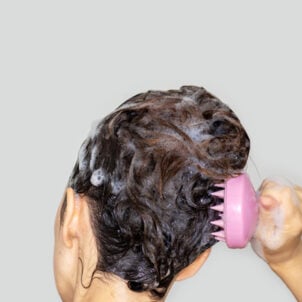
The Scalp Microbiome Explained Plus, The Best Vitamins for Hair Growth
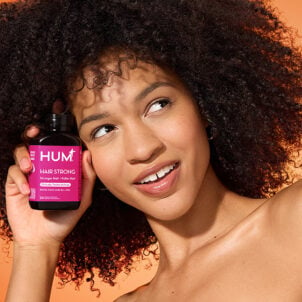
Your Best Hair in One Capsule: Grow Healthier, Stronger Strands with HUM’s Newest Capsule, Hair Strong!
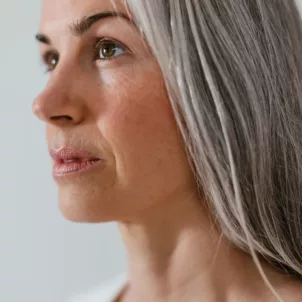
Can You Stop Hair from Turning Gray by Addressing the *Root* Causes?
